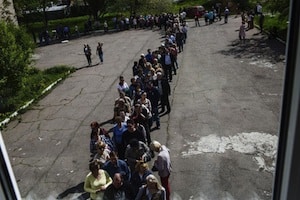
Voters line up in east Ukraine, May 11, 2014
A few months ago we were being told by supporters of the Kiev putsch that President Viktor Yanukovich had “lost the mandate of heaven” by “killing his own people.” This emotive language avoided any discussion of two important facts. The first was that the Kiev mob had contained seriously violent elements, including armed men. The second was that Mr. Yanukovich had not been lawfully removed by the impeachment process provided for under the Constitution of Ukraine, and that his unconstitutional deposition had undone a negotiated agreement which would have allowed him to serve out his lawful term.
I said at the time, and have repeated since, that these facts were awkward for liberal interventionists who sided with the putsch because they a) didn’t like Yanukovich (nor do I, as it happens, and nor does Vladimir Putin), b) believed that Ukraine should move closer to the EU and NATO and c) confused these objectives with various forms of idealism and utopianism among the Kiev crowd which (like most such crowds) believed it had stormed heaven and could somehow overcome corruption and incompetence by sheer force of will and youth.
…
Well, I have long said that any government trying to maintain control over its sovereign territory may sometimes resort to “killing its own people,” and this is not, for me, in itself a decisive factor. Sometimes such action might be legitimate. What if, in the final months of the Weimar Republic, a free government’s police and troops had shot down scores of Nazi storm troopers, and by doing so turned the tide? What would we then think of “shooting your own people”?
My own opinion is and remains that the EU and the USA provoked this action irresponsibly and without sufficient understanding of politics, history or geography, and so launched a period of dangerous turmoil in which innocents have died and will die. My most fundamental criticism of it is that it was stupid and cruel. I also think it was plainly wrong, and I lack sympathy with the objective of bringing Ukraine into the EU or NATO, think this is in itself dangerous, a provocation of Russia which will make Ukraine less stable and prosperous, not more so.
Despite the squawks from Washington and Brussels that the separatist referendums are “illegal” (which is an interesting question, see below) , the real illegality in Ukraine remains the status of the existing Ukraine government, which came to power on the backs of a mob and has not followed its own constitution, and is now “killing its own people.”
Where the source of law is itself unlawful, how can challenges to that source be ruled as “illegal.” No doubt the votes in Lugansk and Donyetsk leave much to be desired. But they are at least as legitimate an expression of popular opinion as is the Maidan protest, which to my knowledge never held any votes at all, just used the crowd’s traditional prerogative of intimidation by numbers.
And now this lawless regime in Kiev has authorised the killing of its own people. So where are the condemnations of those who said that such an action destroyed the legitimacy of the previous government? Nowhere. They are invisible and inaudible, because they have not been uttered and do not exist.
Fair use excerpt. Read the full article here.
